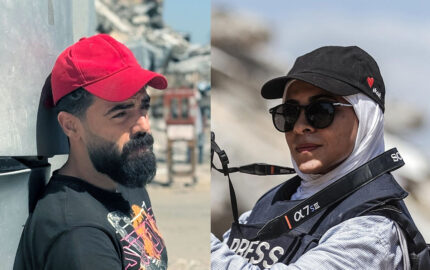
The Bloomberg News investigation “Sign Here to Lose Everything,” a five-part series about predatory lending practices in the merchant cash-advance industry, is winner of the 2018 Taylor Family Award for Fairness in Journalism.
Reported by Zachary Mider and Zeke Faux, the series revealed how an obscure legal document called a “confession of judgment” used New York’s court system to collect debts, bankrupting businesses and ruining lives in the process.
One of the victims the reporters profiled was Florida real estate agent Janelle Duncan, who, like many other borrowers, had signed a confession of judgment as part of her loan application. By signing, she forfeited her legal rights, allowing the lender to file a court case against her without her knowledge and to win it without a hearing or proof. Over the course of four months, Mider and Faux interviewed dozens of other borrowers who described lenders forging documents, lying about how much they were owed or fabricating defaults.
The reporters developed sources within the industry and convinced them to explain their tactics. They also worked together with Bloomberg database editor David Ingold and graphics reporter Demetrios Pogkas to analyze thousands of New York state court records and found that over the course of four years, cash-advance companies had used confessions to obtain more than 25,000 judgments against borrowers across the country, worth an estimated $1.5 billion.
Others who contributed to the series were editors Robert Friedman from Bloomberg News and Jeremy Keehn from Bloomberg Businessweek magazine.
Commenting on the series, Taylor Award judge Jason Grotto said: “The reporting gets to the heart of fairness not only in shining a light on the growth of an inexcusable practice boom, but also in the way the stories were reported and conveyed to readers, drilling down into the slimy origins of confessions while taking pains to track down practitioners to call them to account.”
The Bloomberg investigation has led to significant reforms: It triggered an investigation by the New York attorney general’s office; various New York state lawmakers proposed bans on confessions of judgment and other related legislation; bipartisan bills to ban COJs were introduced in both the U.S. Senate and the House; New York City Mayor Bill de Blasio called for a review of the city marshal program; and some county clerks stopped processing COJs.
The Taylor Award judges also recognized two finalists:
- “Unprotected,” a ProPublica investigation published in collaboration with Time magazine, revealed that a highly lauded American charity operating in Liberia betrayed the very girls it was supposed to keep safe, concealing rapes of girls by a prominent man working within the charity.
- “Heartbroken” by the Tampa Bay Times showed that pediatric heart surgery patients had died at an alarming rate at Johns Hopkins All Children’s Hospital in Petersburg, Florida, despite warnings that certain procedures were putting children at risk.

In “Unprotected” ProPublica reporter Finlay Young and photojournalist Kathleen Flynn exposed the dark side of the More Than Me charity, founded by American Katie Meyler to help protect vulnerable Liberian girls from sexual abuse and provide them with an education. Meyler and the charity instead turned a blind eye to rapes committed by a key employee—her Liberian co-founder Macintosh Johnson—with whom she had an intimate relationship.
Undaunted by the charity’s efforts to squelch the story, the reporters persevered, taking special care to protect the girls’ identities to avoid further victimization, as many still relied on the charity and feared retribution for speaking out. The reporters used thousands of pages of records, including confidential More Than Me documents, and tracked down 80 sources, exposing the degree to which the charity compromised the girls’ safety.
They also went to great lengths to make sure the story reached people in Liberia, many of whom cannot read, working with video journalist Nadia Sussman to produce ProPublica’s first feature-length documentary, which was distributed for free online. The film helped produce important reforms.
After “Unprotected” was published, More Than Me apologized to the victims and announced schoolwide HIV testing, as Johnson had died of AIDS. Meyler stepped down pending the outcome of investigations by the Liberian government, the charity’s board of directors and its Liberian advisory board. Board members resigned, protestors marched in Monrovia and a major donor, the NoVo Foundation, suspended funds, citing the organization’s lack of honesty.
The story also inspired a protest movement in Liberia and “We Are Unprotected” has become a banner slogan under which Liberian women continue to campaign for improved laws and protection systems.

In “Heartbroken,” Tampa Bay Times reporters Kathleen McGrory and Neil Bedi discovered serious problems related to heart surgeries at Johns Hopkins All Children’s Hospital. Pediatric patients had died, infection rates soared, sutures burst after surgery, patches designed to cover holes in tiny hearts failed and surgical needles were mistakenly left inside patients.
The reporters faced special challenges: information was not available in public records, the hospital declined to share internal data and the federal government’s procedure to calculate heart surgery mortality rates from hospital bills was not usable.
Undeterred, Bedi and McGrory developed a method to analyze millions of rows of patient data and had top experts review and confirm its accuracy. The reporters also spent months gaining the trust of families who had suffered tragic loss. They presented their analysis using an interactive webpage to explain their methods to both patients and heart surgeons, and published the results and computer code online.
After the stories ran, six senior Johns Hopkins All Children’s Hospital officials resigned, including the CEO, and Johns Hopkins vowed to make safety changes across its system. The Johns Hopkins board hired a former federal prosecutor at a top global law firm to conduct an investigation into what went wrong and has vowed to share “lessons learned.”
In addition, federal inspectors said Johns Hopkins All Children’s Hospital had put patients in “immediate jeopardy” of harm; regulators found serious, systemic problems that went beyond the Heart Institute; the president of the Johns Hopkins Health System told employees in a private town hall that the hospital had found 13 cases where its care harmed children; and state lawmakers are considering a bill to revamp the pediatric heart surgery oversight board. The hospital has received claims from at least 11 families and is hoping to negotiate with them “pre-suit” and has agreed to admit liability in most cases.
In addition to investigative reporters McGrory and Bedi, the members of the team that produced “Heartbroken” are photojournalists Eve Edelheit (formerly on staff) and Monica Herndon, data reporter Connie Humburg; designer Tara McCarty; deputy editor for investigations Adam Playford; and former director of video/multimedia Danese Kenon. Additional research and reporting was done by reporters Divya Kumar and Martha Asencio Rhine and senior news researcher Caryn Baird.
The judges who selected this year’s Taylor Award winner and finalists are Mike Baker, an investigative reporter at The Seattle Times and a 2017 Taylor Award finalist for “Quantity of Care”; Jason Grotto, a reporter at ProPublica Illinois and a 2015 Nieman Fellow who won the 2017 Taylor Award for “The Tax Divide”; and Souad Mekhennet, a 2013 Nieman Fellow and staff writer for The Washington Post who covers security and terrorism.
The Taylor Award will be presented on May 1, 2019 at the Nieman Foundation for Journalism at Harvard. The honor includes a $10,000 prize for the winner and $1,000 each for the two finalists. The award program was established through gifts for an endowment by members of the Taylor family, who published The Boston Globe from 1872 to 1999. The purpose of the award is to encourage fairness in news coverage by America’s journalists and news organizations.
The Nieman Foundation for Journalism at Harvard educates leaders in journalism and elevates the standards of the profession through special programs that convene scholars and experts in all fields. More than 1,600 journalists from 97 countries have been awarded Nieman Fellowships since 1938. The foundation’s other initiatives include Nieman Reports, a quarterly print and online magazine that covers thought leadership in journalism; Nieman Lab, a website that reports on the future of news, innovation and best practices in the digital media age; and Nieman Storyboard, a website that showcases exceptional narrative journalism and explores the future of nonfiction storytelling.



